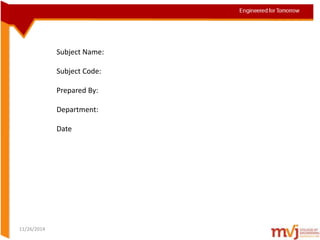
Management and entrepreneurship
- 1. Subject Name: Subject Code: Prepared By: Department: Date 11/26/2014
- 3. NATURE OF PLANNING • Most basic function of management • “Deciding in advance” as to what to do , how to do , when to do and who has to do it • Intellectual process • Continuous process • Involves selection of objectives and goals and determines the ways and means to achieving them • Bridges gap from where we are to where we want to be • Flexible in all areas like technology, marketing , finance , personnel and organization 11/26/2014
- 4. CHARACTERISTICS OF PLANNING • Contribute to accomplish purpose and objectives • Parent exercise in all processes • Spread through all management functions • Efficient enough to achieve designed goals at least cost 11/26/2014
- 5. IMPORTANCE OF PLANNING • Overcomes uncertainty and change and thus minimises risk • Planning helps to make logical decisions • Facilitates effective control • Planning sets goals, targets and means to accomplish these goals • Focuses attention and concentration only on the objectives of enterprise • Makes economic operation and leads to success • Serves as a bridge between present and future 11/26/2014
- 6. PURPOSE OF PLANNING • To select from may available alternatives • To direct all other functions of management • To set up goals • Enables to break the overall planned goal into simpler additive segmented goals • Forms the basis for budget • Forecast the future • Provides effective control • Search for alternatives and adopt the best • To focus the vision on objectives and goals 11/26/2014
- 7. OBJECTIVES • “Objectives are goals or targets which one wishes to achieve” OR “Objectives are goals or targets towards which all business activities are directed” Requirements of good objective • clear and acceptable • Support one another • Should be precise • Must be measurable • Realistic and valid ones 11/26/2014
- 8. TYPES OF PLANS (BASED ON ITS NATURE) Strategic Planning • Long Term • Performed at top management • Consist of major goals and policies of an organization and resources and facilities to accomplish the goals • Less detailed, focuses only on long term goals • Based on long term goals and is more uncertain Tactical Planning • Short Term • Performed at Lower levels of management • Consist of use of resources and facilities • More detailed, focuses only on day to day operations • Based on performance and is less uncertain 11/26/2014
- 9. TYPES OF PLANS (BASED ON ITS USE) Single use plans • Developed to achieve a specific end • Plan becomes useless after reaching target Standing Plans • Designed for situations that often repeat • Plans can be used again and again 11/26/2014
- 10. DECISION MAKING • Integral part of planning process • Defined as the process of choosing among alternatives • Occurs in all stages of planning process 11/26/2014
- 11. TYPES OF DECISIONS Pragmatic • Decisions taken with the purview of policy,rules or procedures • Also called as programmed,routine or structured decisions • Taken frequently and are repetitive in nature Non Pragmatic • Called as non-programmed or strategic or policy decisions • Heavy expenditure and taken by top management 11/26/2014
- 12. TYPES OF DECISIONS Individual Decisions taken by a single individual Taken when the problem is of routine nature and definite rules and procedures exist. Collective Decisions taken by a committee or group of people Interdepartmental decisions and important strategic decisions are taken by a group Advantages • Increased acceptance • Better communication • Better co-ordination • Disadvantages • Delay in arriving at decision • Group may be indecisive • Groups may compromise or dominate 11/26/2014
- 13. NOMINAL GROUP AND DELPHI TECHNIQUES The Delphi method : A more formal method of jury of opinion method. - A panel of experts who are physically dispersed and anonymous to one another is given a situation and asked to make initial prediction on the basis of a prescribed questionnaire - these experts develop written opinions. - these responses are analyzed and summarized and submitted back to the panel for further considerations Nominal group technique : - Members independently generate their idea and give in writing - Ideas are summarised and discussed for clarity and evaluation -Each member silently rates his/her idea through a voting system -One with maximum vote is selected 11/26/2014
- 14. Types of decisions Minor Decision • Decisions related to day to day and periodical occurrences Major Decision • Decision taken by top management 11/26/2014
- 15. TYPES OF DECISIONS • Minor and Major Minor - Decisions related to day to day and periodical occurrences Major - Decision taken by top management • Strategic and Routine Strategic – Similar to major decisions and taken by top management. Routine – Decisions related to the day to day operations of an organization • Simple and Complex Simple – Related to few number of variables Complex – Many variables • Temporary and Permanent Temporary-Temporary in nature and are taken to meet an unexpected solution Permanent- Permanent in nature 11/26/2014
- 16. STEPS IN DECISION MAKING 11/26/2014
- 17. STEPS IN PLANNING AND PLANNING PREMISES 11/26/2014
- 18. HIERARCHY OF PLANS • The top management sets the goals and objectives(long-term plans and strategies) • Such objectives are broad and achieved by strategies. • Strategies are carried out by two types of plans. Single-use plans Standing plans • Action plans are routine plans executed by lower level management. 11/26/2014
- 19. HIERARCHY OF PLANS 11/26/2014 Goals & objectives Strategies Single use plans Standing Plans Action Plans Top Level Management Middle Management Foreman & Supervisors